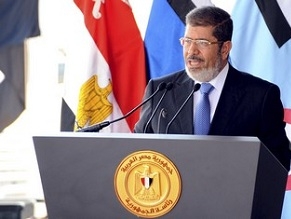|
World Jewish News

Egyptian President Mohamed Morsi Photo: REUTERS
|
Morsi invites opposition to dialogue on elections
25.02.2013, Israel and the World Egyptian President Mohamed Morsi invited opposition parties to a meeting on Monday to discuss concerns about upcoming parliamentary elections, which some parties have threatened to boycott, and agree on ways to ensure their fairness.
The invitation was similar to offers Morsi has made previously that were spurned, and the National Salvation Front opposition coalition immediately rejected the offer to meet.
"I tell everyone of all colors of the spectrum, to all dear brothers in different parties across Egypt, I approach them by name, by party, by persons to sit tomorrow and put down guarantees for transparent and fair elections," Morsi said in a recorded appearance on a television talk program on Mehwar channel aired late on Sunday.
Morsi also sought to dispel speculation that there were growing tensions between the army and the presidency. Some Egyptians, frustrated with what they view as Morsi's poor performance over the past seven months, have called for the military again to run Egypt.
Egypt's military has been a central force in politics since army officers staged an overthrow of the monarchy in 1952.
"There could never be disagreement between the armed forces and the presidency because the president and the armed forces are not two factions, they are one, and the Supreme Council of the Armed Forces is extremely professional," Morsi said on the show.
In addition, Morsi said he has a strong relationship with the intelligence apparatus.
"The General Intelligence is directly subject to the presidency of the republic, subject to me...I support, trust, protect and love them, and wish them well because through them Egypt's security is protected internally and externally," he said.
Egypt on Saturday brought forward by five days the start of the elections to April 22 to defuse a dispute with the Christian community, which makes up a tenth of the population, after they said the original schedule would conflict with their Easter celebrations.
Transition to democracy
Morsi said the elections could conclude Egypt's turbulent transition to democracy, which began two years ago with the overthrow of autocrat Hosni Mubarak by popular protests.
Various opposition groups have said they would boycott the legislative elections, a move that could delegitimize the electoral process, which is due to take place in four stages and culminate with the sitting of the new lower house of parliament in July.
The opposition has said that by deciding to hold elections Morsi and his Muslim Brotherhood movement trivialized the deaths of around 60 people in anti-government protests since January and was only concerned with securing parliamentary seats.
They accused the Brotherhood of seeking to dominate all state institutions and said the electoral constituencies were "tailor-made" for the Brotherhood's Freedom and Justice Party and that there were no real guarantees of fair elections.
The National Salvation Front (NSF), which groups a number of parties opposed to the Islamists, is due to decide in the coming week whether to join the boycott as a movement. But it immediately rebuffed Morsi's call for a dialogue on elections.
"It makes me angry. You take the decision (to hold elections) and then say, 'Come to talk to me'," Khaled Dawoud, an NSF spokesman, told Reuters.
Some of the NSF's main parties have individually said they would boycott, including the Dostour party of Mohamed ElBaradei, a former UN nuclear agency chief. He drew comparisons with the last parliamentary polls to be held under Mubarak in 2010, a vote that was widely seen as rigged.
Morsi's television comments were aired almost seven hours later than the time the presidency had announced and well past midnight, which provoked dismissive reactions from opponents.
Bassem Youssef, a popular satirist who lampoons public figures, wrote on Twitter: "Has anyone seen Mohammed Morsi?"
A joke from political activists that made the rounds on social networking sites ran: "According to which timing is the program being aired? Egypt's, Qatar's or the United States?" referring to the United States' and Qatar's foreign policies, seen as backing the Brotherhood.
JPost.com
|
|
